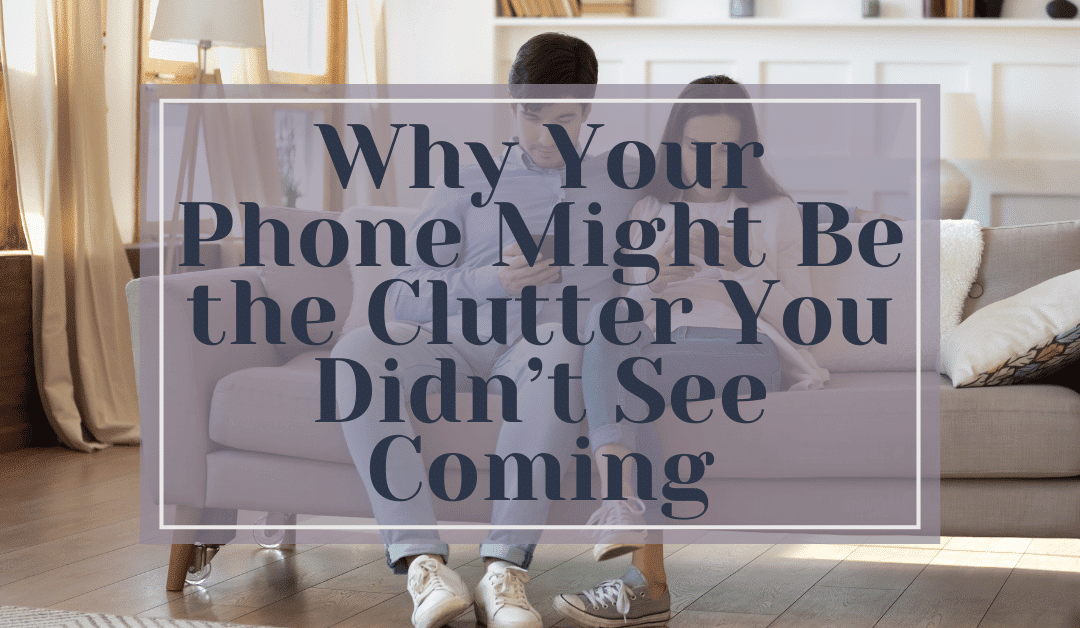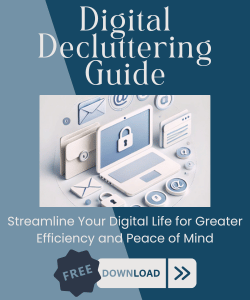Let’s be honest: this is something I struggle with.
I’ve caught myself picking up my phone for literally no reason at all… mid-thought, mid-task, mid-sentence. Sometimes I open an app and can’t even remember why. I know I’m not alone in this (right?), and while it might feel harmless in the moment, those little check-ins add up fast. And they chip away at your focus, your energy, and—let’s be real—your free time.
Technology is great when it works for you, but it’s easy to let it take the wheel. When screens start running the show, everything else starts to feel a little… cluttered. Mentally, emotionally, and even physically. So if you’ve been feeling scattered, unfocused, or like you’re just bouncing from one notification to the next—you’re in good company.
Here’s why it matters, and how to start reclaiming some of that precious offline time.
Why Too Much Screen Time Is a Problem (Even If You Swear You’re “Just Checking Something Real Quick”)
-
Eye strain – You know that dry, blurry-eyed, “I’ve just been staring into the void” feeling? Yeah. That’s screen-induced eye strain. Not fun.
-
Sleep sabotage – That blue light your phone emits? It’s basically a digital espresso shot for your brain. Not ideal when you’re trying to wind down.
-
Couch potato syndrome – More screen time = less movement = your body quietly asking if you’ve forgotten it exists.
-
Mental overload – Screens are stimulating, but not always in a good way. The constant input can spike anxiety, lower your mood, and make you feel like your brain has 47 tabs open at once (and one is playing music but you can’t figure out where it’s coming from).
-
Addiction – You might not be technically addicted, but if reaching for your phone is your default move during any pause in the day… it’s worth paying attention to.
-
Social shrinkage – More time online often means less time engaging with people IRL. And I think we can all agree that meaningful connection > doomscrolling.
How to Cut Back (Without Moving Into a Cabin in the Woods)
If the idea of cutting screen time sounds overwhelming or unrealistic, don’t worry. You don’t have to toss your phone out the window (tempting though it may be). These small shifts can make a big difference:
-
Start with a goal – Nothing intense. Maybe just “30 minutes less each day” or “no scrolling after dinner.” Keep it doable and build from there.
-
Track it – Your phone can tell you exactly how much time you’re spending on it. (Spoiler alert: it’s usually more than you think. Sorry.)
-
Create screen-free zones – Your bedroom, the dinner table, the bathroom (yes, I said it)—pick a few sacred spaces where your phone just isn’t invited.
-
Swap scrolling for something soothing – A book. A walk. A hobby you forgot you had. Even reorganizing a drawer can feel wildly satisfying after too much screen time.
-
Practice mindfulness – It’s not about sitting in silence for an hour (unless you want to). Just start noticing why you’re reaching for your device. Bored? Avoiding something? That awareness is step one.
-
Set time boundaries – Check emails at set times. Limit social media to certain parts of the day. You don’t have to be available 24/7. (And the world will keep turning, I promise.)
And when you feel that pull to pick up your phone out of habit? Try something analog. Do a puzzle. Stretch. Stand outside and breathe for a few minutes. These tiny moments of presence can bring surprising calm, and help you stay focused on what really matters.
At the end of the day, reducing screen time isn’t about giving things up. It’s about making room—for clarity, for rest, for the kind of life that feels more intentional and a little less… distracted.


